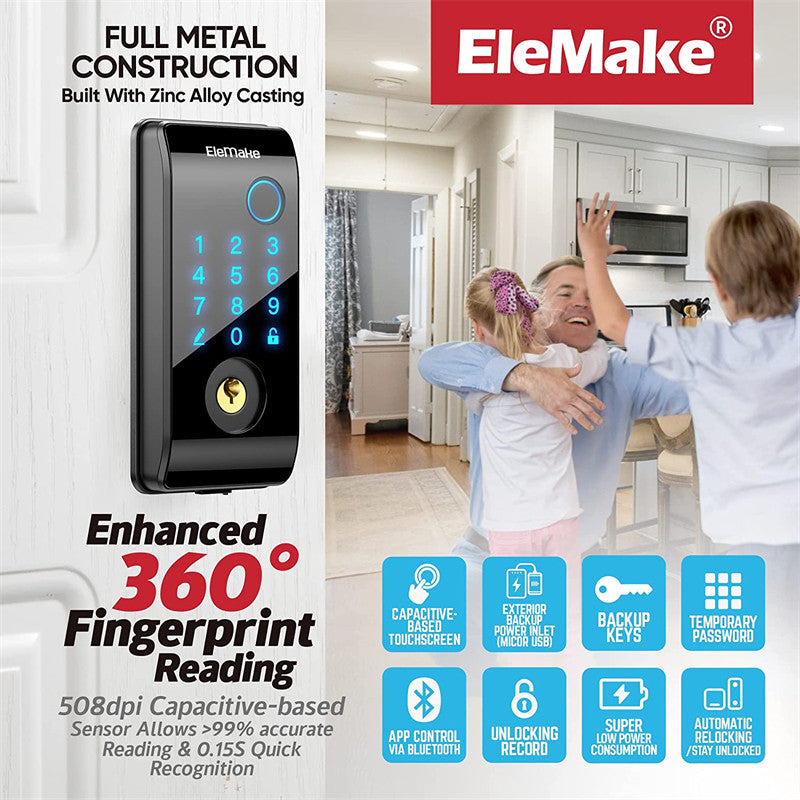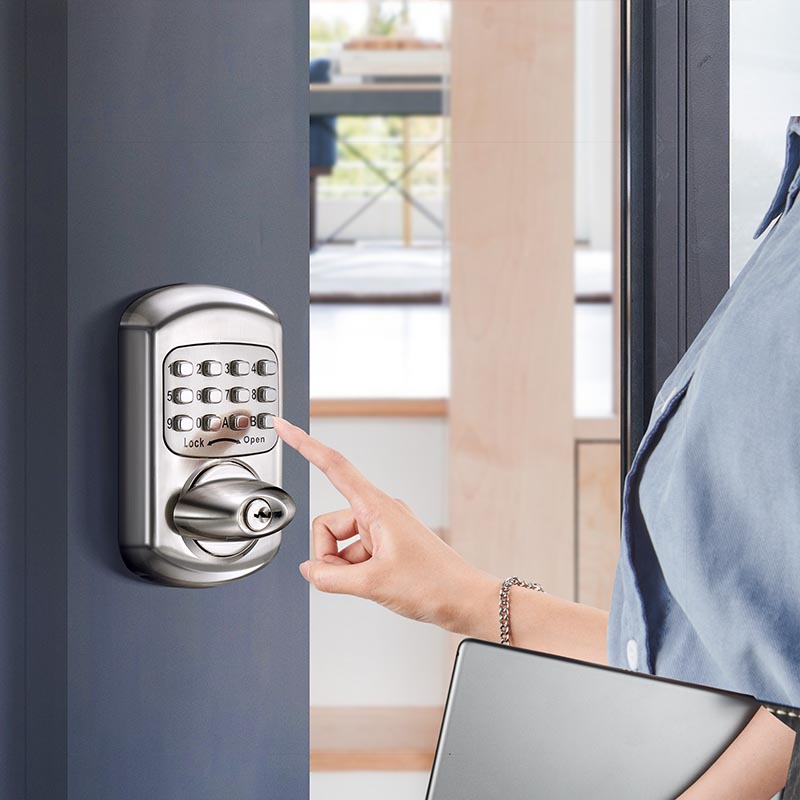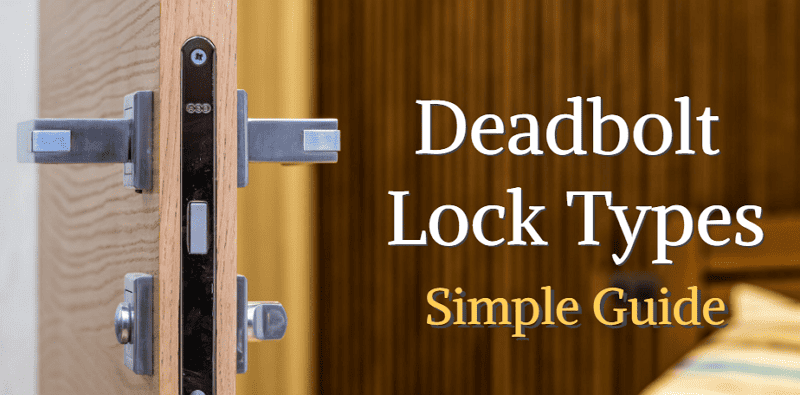8 Different Deadbolt Lock Types for Your Front Door
Your front door is your home's first line of defense. But is your front door truly secure? With a range of deadbolt lock options available, it's essential to choose the right one to ensure your home's safety. From traditional designs to modern innovations, each deadbolt lock type has unique features to offer. In this article, we'll take a closer look at 8 different deadbolt lock types that you can consider for your front door.
1. Single Cylinder Deadbolt
A Single Cylinder Deadbolt is a widely used traditional locking mechanism known for its simplicity and effectiveness. The term "single cylinder" refers to that the lock has a cylinder on one side of the door and a thumb turn on the other. Single cylinder deadbolts are commonly installed on exterior doors to provide an additional layer of protection against unauthorized entry.

2. Double Cylinder Deadbolt
A Double Cylinder Deadbolt is a type of lock typically used for exterior doors that require a higher level of security. Unlike a single cylinder deadbolt, which has a key cylinder on the outside and a thumb turn on the inside, a double cylinder deadbolt requires a key for both the outside and the inside locks. In other words, you need a key to lock and unlock the door from both sides.
However, one key concern is safety during emergencies. If you're inside the house and need to quickly exit, you'll need to locate the key to unlock the door, which could be challenging in stressful situations. This is why double cylinder deadbolts are often not recommended for doors that are part of an emergency exit route.

3. Electronic Keyless Deadbolt
An Electronic Keyless Deadbolt is a cutting-edge door lock that combines advanced technology with convenience and security. Instead of inserting a key into a lock cylinder like in traditional deadbolts, you use a digital code to gain entry. This eliminates the need to carry physical keys, making it a convenient solution for individuals who frequently misplace or forget their keys.

4. Smart Deadbolt
A Smart Deadbolt takes the concept of an electronic keyless deadbolt to the next level by integrating advanced technology and connectivity features. While it also offers keyless entry options like numeric codes or biometric authentication, it goes beyond by connecting to the internet and enabling remote access and control through smartphone apps or smart home ecosystems.
It's important to note that both electronic keyless deadbolts and smart deadbolts require power, usually in the form of batteries. Regular battery checks and replacements are essential to prevent lockouts due to a dead battery.

5. Mechanical Keyless Deadbolt
A Mechanical Keyless Deadbolt is a type of door lock that offers enhanced security and convenience without relying on electronic components or power sources. This innovative lock combines the benefits of a traditional deadbolt with keyless entry methods, providing a reliable and durable solution for securing your doors.

Here's how a mechanical keyless deadbolt works and what sets it apart:
- 100% Mechanical: The standout feature of a mechanical keyless deadbolt is that it operates entirely without electronics. It is a fully mechanical locking mechanism that relies on mechanical components like tumblers, springs, and gears to provide secure access control.
- Keyless Entry: A mechanical keyless deadbolt eliminates the need for traditional keys. Instead, it uses mechanical mechanisms by entering passcodes on the keypad to grant access. This means you don't need to worry about carrying or losing keys.
- Simple and Reliable: Since mechanical keyless deadbolts don't rely on electronics, they are less susceptible to power outages or technical malfunctions. They offer consistent and reliable performance.
- Higher Level of Security: Mechanical keyless deadbolts provide a high level of security against unauthorized entry. The combination or code required for entry acts as a barrier to potential intruders. It also prevents from digital hackers.
- No Batteries Required: Unlike electronic locks that require batteries, mechanical keyless deadbolts don't need a power source to operate. This reduces the maintenance required for the lock.
6. Rim Deadbolt
A Rim Deadbolt is a specialized type of door lock known for its surface-mounted installation and effectiveness in bolstering security. Unlike traditional deadbolts that are recessed within the door, a rim deadbolt is attached to the door's surface.
Rim deadbolts are notably effective at preventing techniques such as kicking or prying that intruders might employ to gain unauthorized access. Their straightforward installation process, compatibility with various door materials, and versatility make them a popular choice in both residential and commercial settings. Additionally, rim deadbolts can be utilized as supplementary locks, providing an added level of security alongside existing door hardware.

7. Vertical Deadbolt
A less common choice, the Vertical Deadbolt, also known as "jimmy-proof" deadbolt, is an upgrade version of rim deadbolts. Its mechanism is similar to the rim deadbolts. The bolt is surface-mounted while the latch is placed on the border.
Unlike traditional deadbolts that extend horizontally into the door frame, a vertical deadbolt features one or two bolts that extend vertically into the strike plate located at the top of the door frame. This vertical locking mechanism makes it difficult for a burglary to unlock a door.

8. Mortise Deadbolt
A Mortise Deadbolt represents a highly secure and sophisticated type of door lock, designed to offer advanced protection for both residential and commercial settings.
Unlike surface-mounted locks, a Mortise Deadbolt is embedded within a prepared pocket or "mortise" in the door. Given that the locking system remains entirely concealed from the external view, any attempts at tampering with the lock using physical force become impossible.

Conclusion
When it comes to home security, choosing the right deadbolt lock type is paramount. By understanding the various options available and considering your specific needs, you can enhance the safety of your home.


